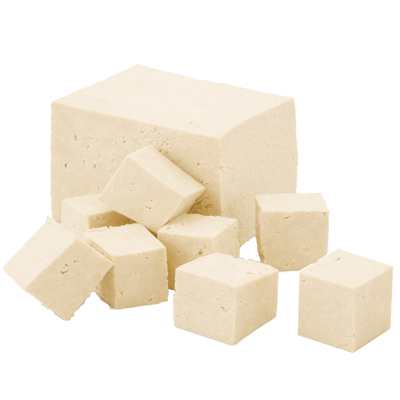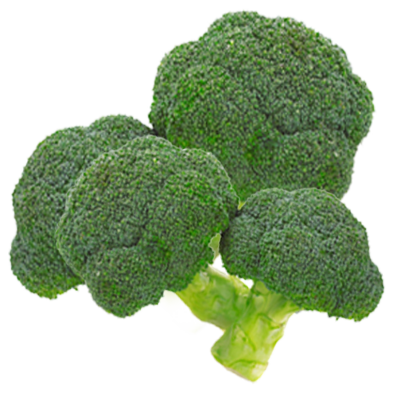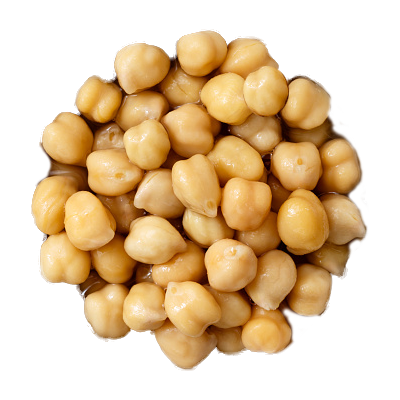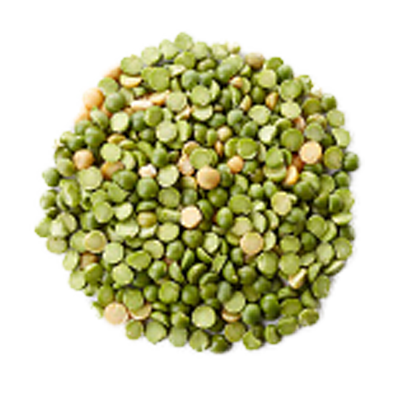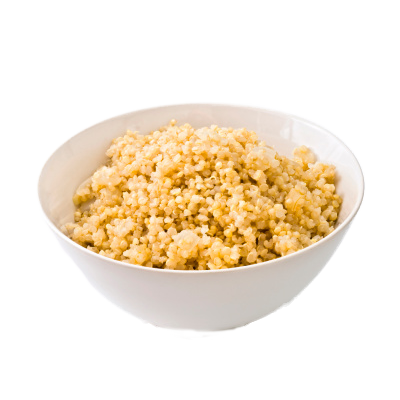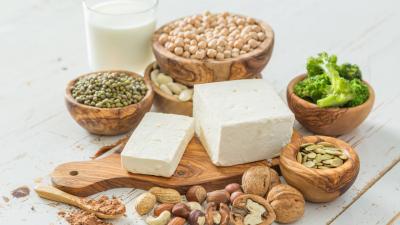Protein
Power Up With Plant-Based Protein
A varied plant-based diet of whole grains, vegetables, and beans can easily meet your daily protein needs, without the risks of animal products.
Protein—an important nutrient that helps build, maintain, and repair body tissue—is widely available in beans, vegetables, and grains.
How Much Protein Do We Need?
Protein deficiency is almost unheard of in the United States. It’s easy to get all the protein you need without eating meat, dairy, or eggs. The recommended daily allowance for protein is 0.8 grams/kilogram/day, which equates to 0.36 grams/pound/day. An average woman needs about 46 grams of protein per day; the average man about 56 grams.1 Research shows that most Americans already get more than enough protein, and a majority of the protein being consumed is animal-based.2 Animal-based protein contains cholesterol, fat, saturated fat, and no fiber compared to plant-based proteins, which typically contain no cholesterol and lower amounts of saturated fat, but do contain fiber.
Are Plant Proteins Complete?
There are 20 amino acids, nine of which are essential amino acids. We need to get the nine essential amino acids from our food, while our bodies can make the other 11 amino acids. Plant-based foods contain all nine essential amino acids, despite the common narrative that they don’t.3 It was once thought that plant-based foods had to be eaten together, also called protein combining, in order to meet your protein needs, but research suggests that as long as the diet contains a variety of grains, legumes, vegetables, and other plant sources, protein needs are easily met.4
Plant proteins usually have lower digestibility scores, in part due to the fiber content, when the Digestible Indispensable Amino Acid Score (also called the DIAAS score) and Protein Digestibility Corrected Amino Acid Score (also called the PDCAAS score) are used. However, there are some issues with these scoring systems which may lead to plant proteins being poorly represented. For example, they use pig and rodent intestines to calculate the digestibility of proteins, which differ from human intestines regarding anatomy and function.5 Thus, these results are not directly applicable to humans. They also use raw foods to calculate the scores, which we know reduces the bioavailability of amino acids in the food. Think of how difficult it would be to digest raw beans. Thankfully, we don’t eat raw beans, and cooking such foods increases the bioavailability of amino acids.6 When we look at human outcomes, we also see that plant proteins are as effective at building muscle compared to animal proteins.7-9 To read more about this research, visit our Nutrition for Athletes page.
Why Plant Protein?
A study published in 2020 found that replacing red meat with high-quality plant proteins such as beans, nuts, or soy was associated with a reduced risk of coronary heart disease.10 Another study found that consuming protein from plant-based foods such as bread, cereal, and pasta instead of animal protein reduced the risk of death from heart disease by up to 12%.11 Research published in BMJ also shows that plant-based protein reduces the risk of early death from any cause and from heart disease.12 For each additional 3% of calories from plant protein, the risk of dying from all causes was lowered by 5%, while consuming animal proteins did not lower risk of death from heart disease or cancer.12
Evidence shows that diets high in animal protein can lead to early death. A study published in 2019 found that those who consumed more meat and protein from animal-based sources in place of plant-based sources increased their risk of death from chronic disease by 23%.13 Another study found that participants who ate the most animal protein had a fivefold increased risk of death related to diabetes.14 Those younger than 65 who ate the most animal protein had a 74% increased risk for death from any cause and a fourfold increase in death related to cancer.14
Research published in 2024 found consuming plant protein was associated with higher odds of healthy aging and being free from several diseases.15 This study also found that replacing 3% of daily calories from animal protein with plant protein increased the odds of healthy aging. Plant protein is also associated with a lower risk of frailty in older women, while animal protein was associated with a higher risk.16
Not only is animal-based protein harmful to human health, but it is also harming the planet. There is an even bigger purpose to swap from animals to plants. Learn more about the effects of how your protein choices affect the environment here.
Plant-Powered Prescription for Protein
- Replace meat with lentils in soups, chilis, stews, and tacos.
- Swap scrambled eggs for scrambled tofu for a delicious breakfast option.
- Choose high protein, whole grains such as quinoa over white rice.
- Replace dairy milk with soy milk, which has the highest protein content out of the non-dairy alternatives.
- Add tempeh to some of your weekly meals, as it’s especially high in plant protein.
Make sure you eat adequate calories from a variety of plants, including beans, grains, and vegetables, to meet protein needs.
Shannon Gray MS, RD, Physicians Committee
Plant-Based Protein Sources
Tofu
1/2 cup firm: 19.9 grams
Broccoli
1 cup: 4.6 grams
Chickpeas
1 cup boiled: 14.5 grams
Lentils
1 cup boiled 17.9 grams
Quinoa
1 cup cooked: 11.0 grams
High-Protein Diet: Healthy or Harmful?
Is a protein obsession doing more harm than help to your health? What researchers have discovered about high-protein diets reveals a startling truth that may have you rethink which nutrients to prioritize in your diet.
The Protein Myth
High-protein diets for weight loss, disease prevention, and enhanced athletic performance have been greatly publicized over recent years. However, these diets are supported by little scientific research. Studies show that the healthiest diet is one that is high in carbohydrate, low in fat, and adequate in protein.
Further Reading
DID YOU KNOW?
Replacing animal protein with plant-based protein lowers mortality risk.
References
- Trumbo P, Schlicker S, Yates AA, Poos M; Food and Nutrition Board of the Institute of Medicine, The National Academies. Dietary reference intakes for energy, carbohydrate, fiber, fat, fatty acids, cholesterol, protein and amino acids. J Am Diet Assoc. 2002;102(11):1621-1630. doi:10.1016/s0002-8223(02)90346-9
- Hoy MK, Clemens JC, Moshfegh A. Protein intake of adults: what we eat in America, NHANES 2015-2016. 2021 Jan. In: FSRG dietary data briefs [Internet]. Beltsville (MD): United States Department of Agriculture (USDA); 2010-. Dietary Data Brief No. 29. Available from: https://www.ncbi.nlm.nih.gov/books/NBK589212/
- Gardner CD, Hartle JC, Garrett RD, Offringa LC, Wasserman AS. Maximizing the intersection of human health and the health of the environment with regard to the amount and type of protein produced and consumed in the United States. Nutr Rev. 2019;77(4):197-215. doi:10.1093/nutrit/nuy073
- Craig WJ, Mangels AR; American Dietetic Association. Position of the American Dietetic Association: vegetarian diets. J Am Diet Assoc. 2009;109(7):1266-1282. doi:10.1016/j.jada.2009.05.027
- Kararli TT. Comparison of the gastrointestinal anatomy, physiology, and biochemistry of humans and commonly used laboratory animals. Biopharm Drug Dispos. 1995;16:351-380. doi:10.1002/bdd.2510160502
- Drulyte D, Orlien V. The effect of processing on digestion of legume proteins. Foods. 2019;8(6):224. doi:10.3390/foods8060224
- Hevia-Larraín V, Gualano B, Longobardi I, et al. High-protein plant-based diet versus a protein-matched omnivorous diet to support resistance training adaptations: a comparison between habitual vegans and omnivores. Sports Med. 2021;51(6):1317-1330. doi:10.1007/s40279-021-01434-9
- Monteyne AJ, Coelho MOC, Murton AJ, et al. Vegan and omnivorous high protein diets support comparable daily myofibrillar protein synthesis rates and skeletal muscle hypertrophy in young adults. J Nutr. 2023;153(6):1680-1695. doi:10.1016/j.tjnut.2023.02.023
- Messina M, Lynch H, Dickinson JM, Reed KE. No difference between the effects of supplementing with soy protein versus animal protein on gains in muscle mass and strength in response to resistance exercise. Int J Sport Nutr Exerc Metab. 2018;28(6):674-685. doi:10.1123/ijsnem.2018-0071
- Al-Shaar L, Satija A, Wang DD, et al. Red meat intake and risk of coronary heart disease among US men: prospective cohort study. BMJ. 2020;371:m4141-m4150. doi:10.1136/bmj.m4141
- Huang J, Liao LM, Weinstein SJ, Sinha R, Graubard BI, Albanes D. Association between plant and animal protein intake and overall and cause-specific mortality. JAMA Intern Med. 2020;180(9):1173-1184. doi:10.1001/jamainternmed.2020.2790
- Naghshi S, Sadeghi O, Willett WC, Esmaillzadeh A. Dietary intake of total, animal, and plant proteins and risk of all cause, cardiovascular, and cancer mortality: systematic review and dose-response meta-analysis of prospective cohort studies. BMJ. 2020;370:m2412-m2429. doi:10.1136/bmj.m2412
- Virtanen HEK, Voutilainen S, Koskinen TT, et al. Dietary proteins and protein sources and risk of death: The Kuopio Ischaemic Heart Disease Risk Factor Study. Am J Clin Nutr. 2019;109(5):1462-1471. doi:10.1093/ajcn/nqz025
- Levine ME, Suarez JA, Brandhorst S, et al. Low protein intake is associated with a major reduction in IGF-1, cancer, and overall mortality in the 65 and younger but not older population. Cell Metab. 2014;19(3):407-417. doi:10.1016/j.cmet.2014.02.006
- Korat AVA, Shea MK, Jacques PF, et al. Dietary protein intake in midlife in relation to healthy aging – results from the prospective Nurses’ Health Study cohort. Am J Clin Nutr. 2024;119(2):271-282. doi:10.1016/j.ajcnut.2023.11.010
- Struijk EA, Fung TT, Rodríguez-Artalejo F, et al. Protein intake and risk of frailty among older women in the Nurses' Health Study. J Cachexia Sarcopenia Muscle. 2022;13(3):1752-1761. doi:10.1002/jcsm.12972

